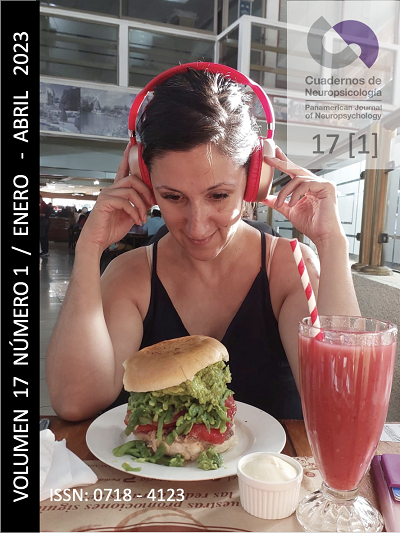Efecto del malabarismo sobre la cognición en personas mayores con movilidad limitada de las extremidades inferiores
Abstract
RESUMEN
El malabarismo es una actividad que produce cambios estructurales cerebrales y cognitivos benéficos a partir del movimiento coordinado de las extremidades superiores del cuerpo, por lo que se propone como una herramienta de intervención para mejorar la cognición en personas mayores con movilidad limitada de las extremidades inferiores. Se evaluó el funcionamiento cognitivo en cinco mujeres de la tercera edad que practicaron malabarismo durante seis meses y que fueron pareadas por edad, escolaridad, entrenamiento rutinario y nivel de deterioro cognitivo, con un grupo control. Las mujeres del grupo de malabarismo obtuvieron mejores puntuaciones en pruebas de planificación, velocidad de procesamiento, flexibilidad cognitiva y memoria en comparación con sus controles. Adicionalmente, las participantes sin deterioro o con deterioro moderado del grupo que practicó malabarismo, mejoraron su desempeño en tareas de memoria de trabajo visual y habilidades visoespaciales y presentaron mayor estabilidad en el funcionamiento cognitivo global. Se sugiere que el malabarismo puede considerarse como una actividad fÃsico-recreativa que permite preservar y mejorar las funciones cognitivas en personas mayores con movilidad limitada de las extremidades inferiores.
Palabras Clave: Malabarismo; envejecimiento; ejercicio fÃsico; actividades fÃsico-recreativas; funcionamiento cognitivo.
Â
ABSTRACT
Juggling is a coordination exercise that produces beneficial brain structural and cognitive changes from the coordinated movement of the upper limbs of the body. It is therefore proposed as an intervention tool to improve cognitive functioning in older adults with limited lower limb mobility. Cognitive functioning was assessed before and after intervention in a group of five elderly women who practiced juggling for six months and were matched by age, schooling, routine training, and level of cognitive impairment with five women who did not practice juggling and who formed the control group. Women in the juggling group scored better on planning, processing speed, cognitive flexibility, and memory tests compared with women in the control group. Moreover, participants without cognitive impairment or with moderate cognitive impairment of the juggling group improved their performance in tasks related to visual working memory and visuospatial skills and showed greater stability in global cognitive functioning. In this sense, we suggest juggling as a physical-recreational activity that allows preserving and improving cognitive functions in older adults with limited lower limb mobility.
Keywords: Juggling; aging; physical exercise; physical-recreational activities; cognitive function.
Â
RESUMO
O malabarismo é uma atividade que produz mudanças cerebrais estruturais e cognitivas benéficas a partir do movimento coordenado das extremidades superiores do corpo, e por isso, se propõe uma ferramenta de intervenção para melhorar a cognição em pessoas idosas com mobilidade limitada das extremidades inferiores. Foi avaliado o funcionamento cognitivo em cinco mulheres da terceira idade que praticaram malabarismo durante seis meses e que foram pareadas por idade, escolaridade, treinamento rotineiro e nÃvel de comprometimento cognitivo, com um grupo controle. As mulheres do grupo de malabarismo obtiveram melhores pontuações nas provas de planejamento, velocidade de processamento, flexibilidade cognitiva e memória em comparação ao seu grupo controle. Além disso, as participantes sem comprometimento ou com comprometimento cognitivo moderado do grupo que praticou malabarismo, melhoraram seu desempenho em tarefas de memória de trabalho visual e habilidades visuoespaciais e apresentaram maior estabilidade no funcionamento cognitivo global. Os resultados sugerem que o malabarismo pode ser considerado uma atividade fÃsico-recreativa que permite preservar e melhorar as funções cognitivas em pessoas idosas com a mobilidade das extremidades inferiores limitada.
Palavras-chave: malabarismo; envelhecimento; exercÃcio fÃsico; atividades fÃsico-recreativas; funcionamento cognitivo.
Downloads
How to Cite
Issue
Section
License
Articles published in this journal are protected under the Creative Commons Attribution-NonCommercial-ShareAlike 4.0 International (CC BY-NC-SA 4.0) license. This means that authors retain full rights over their research and publications at all times. As a journal, we fully respect and promote the principles of open access established by this license, allowing the work to be shared, adapted, and distributed for non-commercial purposes, provided that appropriate credit is given to the authors and any derivative works are licensed under the same terms.
Authors are responsible for obtaining the required permission when they wish to reproduce part of the material (figures, etc.) from other publications.
Likewise, CNPs allows authors to host in their personal sites or other repositories that they deem convenient the Final and Definitive Version of the published article with the format assigned by the journal. In no case do we allow access to preprints of the article under evaluation or already published.
When submitting an article to CNPs you are aware that all the contents of CNPs are under a Creative Commons License. In which it is allowed to copy and share the contents freely, always making reference to the origin of the publication and its author.













